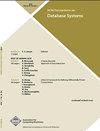通过同义词提高近似字符串匹配的质量
IF 2.2
2区 计算机科学
Q3 COMPUTER SCIENCE, INFORMATION SYSTEMS
引用次数: 9
摘要
字符串相似性度量对两个文本字符串之间的相似性进行量化,以便进行近似的字符串匹配或比较。例如,字符串“Sam”和“Samuel”可以被认为是相似的。大多数现有的计算两个字符串相似度的工作只考虑语法相似度,例如,常见单词的数量或q-grams。虽然这确实是相似度的一个指标,但在许多重要的情况下,语法不同的字符串可以表示相同的现实世界对象。例如,“Bill”是“William”的缩写形式,而“Database Management Systems”可以缩写为“DBMS”。给定预定义的同义词集合,本文的目的是探索这些现有知识,以有效地评估两个字符串之间的相似性,并有效地执行相似性搜索和连接,从而提高近似字符串匹配的质量。特别是,我们首先提出了一个基于扩展的框架,在考虑同义词的同时有效地测量字符串相似度。然后,我们研究了相似性搜索和连接的有效算法,提出了两种新的索引,称为si树和qp树,它们结合了签名过滤和长度过滤策略。为了提高算法的效率,我们开发了一个估计器来估计候选签名过滤器的大小,以实现签名过滤器的在线选择。该估计器提供了强大的低误差,高置信度保证,同时只需要对数空间和时间成本,从而使我们的方法在理论和实践中都具有吸引力。最后,在三个真实数据集上对算法进行了综合研究,实验结果验证了我们方法的有效性和效率。本文章由计算机程序翻译,如有差异,请以英文原文为准。
Boosting the Quality of Approximate String Matching by Synonyms
A string-similarity measure quantifies the similarity between two text strings for approximate string matching or comparison. For example, the strings “Sam” and “Samuel” can be considered to be similar. Most existing work that computes the similarity of two strings only considers syntactic similarities, for example, number of common words or q-grams. While this is indeed an indicator of similarity, there are many important cases where syntactically-different strings can represent the same real-world object. For example, “Bill” is a short form of “William,” and “Database Management Systems” can be abbreviated as “DBMS.” Given a collection of predefined synonyms, the purpose of this article is to explore such existing knowledge to effectively evaluate the similarity between two strings and efficiently perform similarity searches and joins, thereby boosting the quality of approximate string matching.
In particular, we first present an expansion-based framework to measure string similarities efficiently while considering synonyms. We then study efficient algorithms for similarity searches and joins by proposing two novel indexes, called SI-trees and QP-trees, which combine signature-filtering and length-filtering strategies. In order to improve the efficiency of our algorithms, we develop an estimator to estimate the size of candidates to enable an online selection of signature filters. This estimator provides strong low-error, high-confidence guarantees while requiring only logarithmic space and time costs, thus making our method attractive both in theory and in practice. Finally, the experimental results from a comprehensive study of the algorithms with three real datasets verify the effectiveness and efficiency of our approaches.
求助全文
通过发布文献求助,成功后即可免费获取论文全文。
去求助
来源期刊

ACM Transactions on Database Systems
工程技术-计算机:软件工程
CiteScore
5.60
自引率
0.00%
发文量
15
审稿时长
>12 weeks
期刊介绍:
Heavily used in both academic and corporate R&D settings, ACM Transactions on Database Systems (TODS) is a key publication for computer scientists working in data abstraction, data modeling, and designing data management systems. Topics include storage and retrieval, transaction management, distributed and federated databases, semantics of data, intelligent databases, and operations and algorithms relating to these areas. In this rapidly changing field, TODS provides insights into the thoughts of the best minds in database R&D.
 求助内容:
求助内容: 应助结果提醒方式:
应助结果提醒方式:


